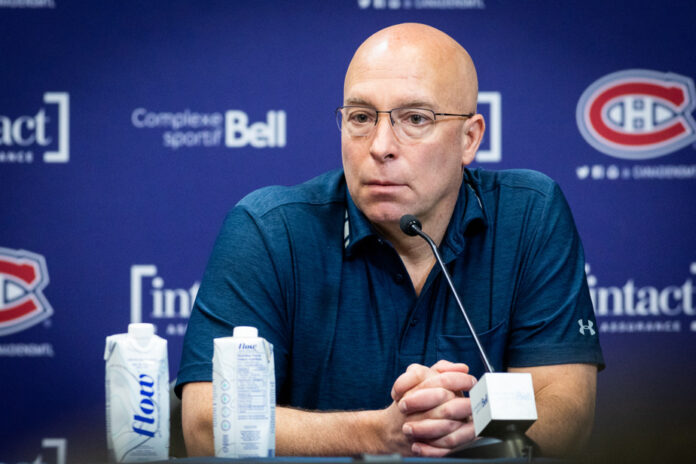At the Canadiens golf tournament last September, Joel Edmundson more or less looked like a weirdo when he said his team wanted to make the playoffs this spring.
By all accounts, the Habs simply didn’t have the ammunition to pull it off, especially not in the NHL’s strongest division.
If the veteran defender reiterates his prediction at the start of the school year, he will seem less alone in his camp. In the end-of-season report on Friday, general manager Kent Hughes said he expects his roster to make a “push” toward the playoffs next year.
This will not be its only evaluation criterion. And he does not impose this challenge as an imperative. But he still utters the word that begins with S for, as far as we know, the first time since he was appointed general manager in January 2022.
The watchword of the season which has just concluded was development. That of the organization and its “culture”, but also that of the players. Hughes believes he hit the mark on both counts. For the majority of the campaign, he saw his troops stand up to clubs that were superior to them. The atmosphere is no longer “heavy” as it was when he arrived. On an individual level, more young players have seen action than expected, particularly as a result of the injury epidemic that has affected his dressing room. They have all gained valuable experience.
Obviously, we were not looking for results. The 31-45-6 record was certainly an improvement over 2021-2022 (22-49-11), but it nevertheless earned the Canadian 28th place overall, which puts him in an advantageous position for get one of the top five picks in the next draft.
To take the next step, Kent Hughes challenges his players to take ownership.
He wants to see his young players not only confirm their ability to play at this level, but also prove that they can “help the team win”. Of his veterans, he expects to see them “working to help everyone.”
If “expectations change”, management is still careful to moderate those of the public. By juggling between optimism and caution.
Jeff Gorton, vice-president of hockey operations, recalled that he did not want to define a precise timetable for the current reconstruction.
“Taking shortcuts and making moves just to get to the playoffs, I don’t think that’s the right direction to go,” he said. Building and growing organically is the thing to do. We all believe that. »
Kent Hughes also spoke of a “balance” to be found between applying additional pressure on his players and not “compromising their development”.
The manager, however, assured that he would not hesitate, if he had the opportunity, to make gestures that could help his team immediately. The team has several assets to conclude transactions between now and the repechage, the first round of which is scheduled for June 28. Jeff Gorton expects his GM to be “active” to “push as much as possible”, as he did last year when he sacrificed Alexander Romanov for a first-round pick he immediately used to acquire Kirby Dach.
Hughes also indicated that he wanted to use his salary “flexibility” to his “advantage”. The expiry of the contracts of Jonathan Drouin, Sean Monahan, Paul Byron and Chris Tierney will erase 16 million in wages. We could even add the 2.9 million of Denis Gurianov who, if he is back, will probably earn less money.
This flexibility gives a competitive advantage to the Habs, who could accept an onerous contract from another team, as they did with Monahan last summer, which also earned the CH a first-round pick from the Flames. from Calgary. However, this maneuver is generally deployed by teams that are not looking to improve in the short term. Hughes insisted on this point: none of the possibilities he is willing to “explore” will affect his “long-term” budget.
His modus operandi remains the same: “If we find a way to improve our team, we will always do it, but without sacrificing the future. A trade to improve us only for next year is not in the cards. »
In short, Kent Hughes wants his team to be in the game next season, without changing his long-term plan.
We feel that the players support this philosophy. Relearning to win, “it’s not a sprint, it’s a marathon”, wisely recalled Joel Edmundson.
Veterans, however, are subtly beginning to tap their feet. Edmundson, even if he is in solidarity with the organization’s approach, admits that the accumulation of defeats sometimes weighs heavily.
Resolutely optimistic, he believes that a “good season”, perhaps as early as next year, could “accelerate the process”.
If this prophecy comes true, it is not Josh Anderson who will complain. For him, “finishing at the bottom of the ranking” is not synonymous with “success”.
This season has been “difficult”, he conceded, although he claims to have learned “a lot of good things”, including individual gains.
Still, injury or not, “we have to be better,” he added.
“We have to come here to win. Sooner or later, this process will have to begin. »
This statement will be interpreted more as a confirmation of Anderson’s competitive spirit than as a snub against management. There is, however, a reminder that reconstruction comes at the cost of sacrifice. And that if the patience of the fans is not infinite, that of the players probably is not either.















